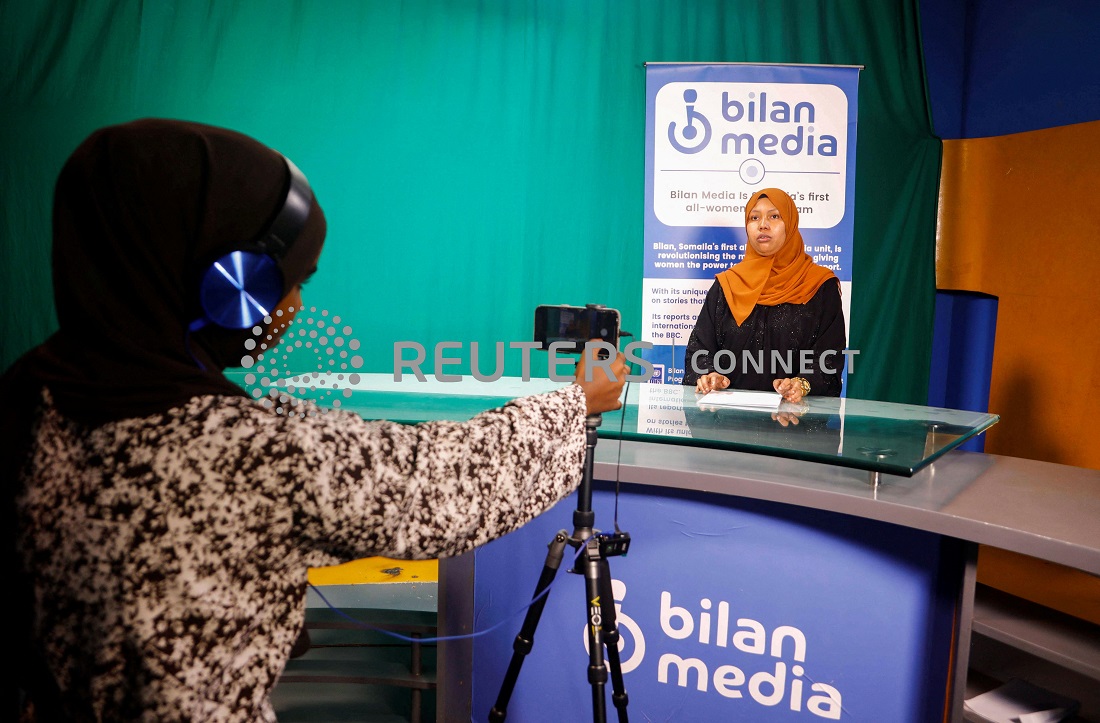By Abdi Sheikh
MOGADISHU (Reuters) – People often laugh when Fathi Mohamed Ahmed tells them she runs the first and only all-female newsroom in Somalia, one of the most dangerous places on the planet to be a reporter.
But Bilan, the media house where Ahmed works as chief editor, is far from a punchline, producing a daily mix of hard news and in-depth features for local and sometimes international audiences.
In its almost 18 months of operation Bilan, which means “to shine a light”, has overcome prejudice and insecurity to illuminate some of the most taboo subjects in Somalia, including a female drug epidemic, albinism, women living with HIV and period shame.
“Sometimes my soul tells me I cannot continue the work because of insecurity and societal pressure. However, it is a career that I loved since my childhood and a dream which still lives in me,” Ahmed said.
Although it is supported by the United Nations Development Programme (UNDP), success has not come easy or risk-free for Ahmed and her team.
With more than 50 journalists killed since 2010, Somalia is the most dangerous country for journalists in Africa, according to Reporters Without Borders.
The Committee to Protect Journalists ranks Somalia last in its Global Impunity Index, which measures the number of unsolved journalist murders as a percentage of a country’s population.
As a deeply patriarchal society, some people find it difficult to discuss women’s issues publicly, Ahmed said. Others complain Bilan’s stories blemish the country’s reputation.
“We know Somalis, for them girls’ issues are shameful,” she said. “For example, signs of adolescence like menstruation, periods. Girls are not taught the symptoms of womanhood in the classroom.”
A story about the stigma surrounding menstruation became one of Bilan’s most viral when it was broadcast earlier this year, garnering more than 130,000 views and dozens of comments on Facebook.
“I used to feel fear when I wanted to share my personal problems with the teacher. I failed to express my problem,” said Maria Abdullahi Jama, a 19-year-old student at Bondhere School in Mogadishu. “I urge students not to feel shame and fear.”
The story prompted the Ministry of Women to offer to work together on an advocacy campaign, and has won over at least one Islamic cleric, a group that often holds the most conservative views in Somali society.
“It is good to give awareness to the girls about period and how to stay clean so they see it as something natural that all women have,” said Sheikh Abdi Hayi, who preaches at the Omar Ibnu Khadab Mosque.
Bilan has revolutionised the news agenda in Somalia, said Abdallah Al Dardari, director of the United Nations Development Programme Regional Bureau for Arab States.
“With their unique voice and the growing reach of the Bilan Media brand, they’re creating a demand for change and better treatment of women and girls that can’t be ignored,” Al Dardari said.
(Reporting by Abdi Sheikh; Additional reporting by Abdirahman Hussein; Writing by Hereward Holland; Editing by Richard Chang)



